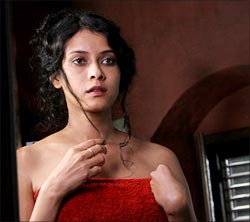 Before the release of The Forest, its director Ashvin Kumar had said, "My expectations from The Forest are very modest. I want people to see what I can do, what my work is all about. I want people to go to the theatres to watch it and hopefully, make it run for a long time."
Before the release of The Forest, its director Ashvin Kumar had said, "My expectations from The Forest are very modest. I want people to see what I can do, what my work is all about. I want people to go to the theatres to watch it and hopefully, make it run for a long time."
It turns out that not many people decided to give the film a shot. Trade analyst Vinod Mirani says that the film was a no-show from the first day itself. He attributes it to the lack of stars in the film, and the 'A' certification.
In an interview with Patcy N, Oscar-nominated director Ashvin Kumar explains why he doesn't use big stars in his films and what filmmaking means to him.
How does it feel that your film made in 2009 will be released now?
It doesn't feel very good. It should have been released right then. But that's the way the business is, I guess.
Why was it stuck for so long?
It was stuck because the film distribution system in India does not look favourably upon independent cinema. Nobody dares to release films like mine even though there is very clear action, thriller, and commercial potential.
In the last few years, films like Haasil and other content-based film have done very well at the box office. This is a question you should ask people who are in the distribution business.
For the independent filmmaker it is remarkably frustrating. When a filmmaker who has got an Oscar nomination one year cannot release his film the next year, it says something about our distribution set-up in India. 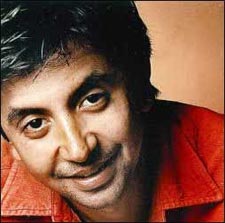 After your Oscar-nominated film Little Terrorist, what made you do a fiction story like The Forest?
After your Oscar-nominated film Little Terrorist, what made you do a fiction story like The Forest?
I don't look at movies as commercial and non-commercial. I make cinema for good stories that I think need to be told.
I chose this subject because I thought there is a serious issue here about wildlife being decimated in front of our eyes. There will be no wildlife left in the wild jungles of India for our children to enjoy.
We are too used to the city and its urban life and we have disconnected ourselves from nature.
My reason for making this film was, if people who come to watch a thriller and be entertained also leave the theatre with the message, then I have achieved something.
How did the story idea come to you? Why does the forest fascinate you?
I have been going into jungles and seeing tigers and leopards since I was a child. As I was growing up, the number of tigers and leopard sightings started going down. Then I read that there are some national parks that are devoid of tigers,
These kinds of statistics really dismayed me. I was very keen to bring the idea of the jungle to the urban audience who have not had this experience.
The story is loosely based on the stories written by the hunter congregation of Jim Corbett which are pretty similar to my story structure. Corbett's stories were about hunting man-eaters. They were thrilling and gripping stories. My idea was similar. When this man wrote stories about the man-eaters, he was trying to express the beauty of the wilderness which is India's natural heritage. I thought I might try to do something similar in the cinematic form
Most of your films are produced by you. Is it difficult to get a producer for such films in India?
All my films are produced by me. I don't think it is difficult to get a producer for the films that I make. I get all my films funded quite successfully outside Bollywood and its traditional system.
But it is difficult for me to get a Bollywood producer for the kind of film that I make because I feel there is over-reliance on stars.
There are only five or seven bankable stars. But there are hundreds of multiplexes and many more screens. Anybody can do the calculation and understand that stars cannot be in every film. So the idea would be to look at the script.
Slowly things are changing. There's a new independent breed of filmmakers. My criterion whenever I make films is that it should be completely independent, and I stick to that. 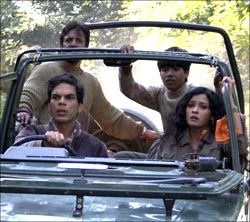 What made you choose Jaaved Jaffery?
What made you choose Jaaved Jaffery?
He is a good actor who gives a great performance. He has never been used in this way before.
People know him for one kind of acting, which is comedy, and in my opinion anybody who can do comedy can do pretty much anything because comedy is the most difficult thing to do.
Jaaved is a wonderfully talented actor whose one side has only been explored. I wanted to show his other side. The way people perceive Jaaved will change after this film where he plays a very dark character
Do you think Jaaved Jaffery can bring audiences to the theatre? Didn't you think of big stars?
I don't believe in Bollywood norms. I believe in a good story and I believe audiences have the sense to understand that stars are not the ones who will get them a good story: it is the director and the story writer.
The stars can only help the film. I don't have to tell you that there are many flops in the last two years of films with big stars in them than of films with no stars.
I have been saying this from the beginning, but it is just now that people have realised it: that audiences go to the theatre to watch the story and not the stars, unless you have a Salman (Khan) or an Aamir (Khan).
Like I said, there are only five top stars who can command audiences; other than that you need to have a film with a story in it. No matter which star you put in, if the story is not good the audience will not come.
What sort of audience are you aiming for with The Forest?
Primarily, young, urban, middle class. When I say young I mean all the way from 18 to 45.
Why do you make festival kind of movies? Other than The Forest, you haven't made films for mainstream audiences.
Yes, that is correct. I don't make movies to make money. Money is great if it comes. I make movies because I feel passionate about them and I feel there is an issue that needs to be highlighted.
Now, if that ends up at the festival or whether it goes to television or goes into mainstream commercial release, that is totally to do with economics and marketing.
I work as a passionate filmmaker. I don't really do mathematics before I make the film.
There are lots of new-age directors like Dibakar Banerjee and Anurag Kashyap making interesting movies. Will you ever try your hand at making a blockbuster comedy like Housefull-2?
The Forest is such a film. What else is it?
If the subject is interesting I will do whatever if it means something to me.
What do you think of movies like Housefull-2 and the Golmaal series?
I haven't seen them.
Which is the best and worst Hindi film you have seen recently?
I can say that the best movie is Delhi Belly by far. After Jaane Bhi Do Yaaro that is the great comedy that has been made in India.
Do you prefer not to work with stars?
To be honest, I prefer to work with actors. For me the story is the star, so I want to work with people who can bring the story out.
You have worked with Irrfan Khan at the start of your career in Road to Ladakh. How has Irrfan progressed as an actor according to you?
I think he was always superbly talented; it took so much time for him to come out because the industry was not ready for an actor like him. But once he is out there, you can see the kind of attraction he has.
I think he is an individualistic actor. He has his own theory of how to go about acting. He is very subtle. He makes the whole acting process look effortless.
Anybody who has acted understands that it takes a lot of technique and talent to be able to do what he does. He is one person who is an actor and a star. I would really like to work with him again.
What are your forthcoming films?
I am making a commercial film and will find a star to act in it. It is called Hype.
It is the story of three friends. The most important character is the girl who is 22. It is set in Delhi and is a love story but not your conventional love story.






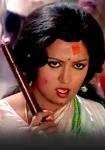



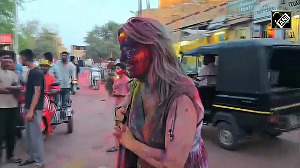
 © 2025
© 2025